We are pleased to announce that CMP’s discourse analysis team has now released its monthly “discourse climate report” for September 2018, looking at how the core vocabularies of the Chinese Communist Party are moving in the official media, under the direction of Qian Gang. The report is available in Chinese below.
A few highlights. The report notes that the phrase pairing “one position as the highest authority, making the final decisions” (定于一尊, 一锤定音), which seemed to aggrandize Xi’s leadership position and was used in both July and August in the People’s Daily, was not used in September. You can read our July discussion of the history of these phrases here. The only use last month of the term “one position as the highest authority” in isolation came in a piece about the development of rule of law in China since the 18th National Congress of the CCP, and used the phrase in a negative context: “There does not exist in the world a model of rule of law that is in a position of supremacy, nor does there exist a path to rule of law that can be applied everywhere.”
The September report also takes a look at the history in the People’s Daily of the term “socialist transformation” (社会主义改造). The term became a topic of discussion outside official state media in September, thanks in large part to an online post claiming China was entering a “second era of socialist transformation.” For a summary of this story, our readers can turn to Qian Gang’s October 3 analysis.
Our September report concludes with a look back on the history of the phrase “supervision by public opinion” (舆论监督), which in the reform era has long encompassed the notion that the press should have a role in monitoring power.
The phrase was used more actively after 1992, following Deng Xiaoping’s “southern tour,” and by 1994 was being given a definite degree of priority by the top leadership. The period from 2003-2012 marked what now appears in retrospect to have been a rare decade for “supervision by public opinion,” in which the phrase signaled the rising power (and right) of the media to set the agenda through more critical, and even investigative, coverage — aided by changes in technology, and by the general development of (more or less) civil society (公民社会).
Since 2013, and the final ill-fated “New Century Forum on News Supervision By Public Opinion” (新世纪新闻舆论监督研讨会) — a conference on watchdog journalism organized for more than a decade by CMP fellow Zhan Jiang (展江) — the environment for “supervision by public opinion” has worsened considerably. The phrase “supervision by public opinion” has been usurped almost entirely by the phrase “channeling of public opinion” (引导舆论), a term for the active control by the authorities of news topics and discussion.
As a phrase of importance, it seems, “supervision by public opinion” is history.
——————————————
九月语象速递丨全凭爹爹做主
9月,17级台风“山竹”袭击广东-海南沿海;女性维权声浪中,滴滴事件一波未平,快递事件又掀波澜。在词云图中,16字长语热度不减。

根据香港大学新闻及传媒研究中心中国传媒研究计划(CMP)划分的六级语温梯度(沸、烫、热、暖、温、冷),9月关键词语温分布如下:
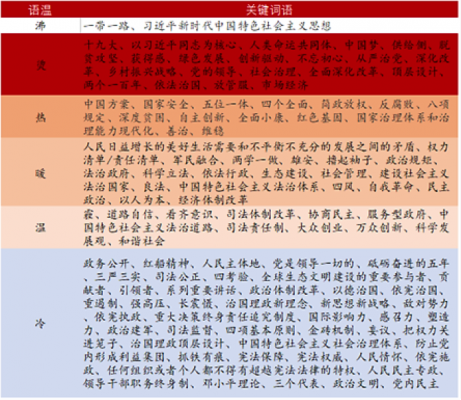
九月,关键词语的语温变化几乎为一级升降,只有两词例外:“维稳”跳动两级,由温升热;“雄安”跳动两级,由冷升暖。
全面深化改革、两个一百年、依法治国、市场经济为本月“新烫”,上月为热词。其中,市场经济为八月新词。
结合前几个月看,八月一些热词降了温,九月又纷纷恢复为热词,如:五位一体、四个全面、红色基因、深度贫困。“善治”一词更是三个月以来连连升温,由冷升热。这些词语大多与十九大关联。
也有不少词语热度降低,如军民融合、四风、生态建设由热降暖;协商民主、大众创业、万众创新由暖降温;以德治国、政务公开、妄议、政治建军、邓小平理论、三个代表由温降冷。
13个关键词测温
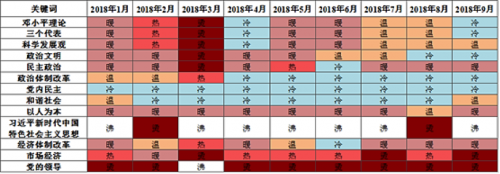
本月邓小平理论、三个代表两词持续降温,由温入冷。从二月起一直凉凉的“和谐社会”由冷转温,半数相关报道与“三农”问题相关,如9月28日《人民日报》重刊习近平总书记在上海工作期间对推动“三农”发展的思考与实践,其中,他在2007年5月13日上海市委八届十二次全会讲话中提出,要把上海农民民生问题解决好,上海才能率先构建社会主义和谐社会。
“以人为本”和“市场经济”均在经历8月降温后升温,分别回归“暖”“温”序列。
16字长语在经历了8月的短暂降温后,再次回归沸点。
中央政要

他(684次)仍然遥遥领先,李克强持平为烫词(48次),较上月(76次)有大幅下降。九月,他出席中非合作论坛北京峰会、赴俄罗斯出席第四届东方经济论坛、对非洲4国进行国事访问、出席金砖国家领导人第十次会晤。李总理本月出席了第十二届夏季达沃斯论坛、公布《国务院关于修改部分行政法规的决定》,对10部行政法规的部分条款予以修改。
除了这两位,其他人出现频率如图所示。中央外事工作委员会办公室主任杨洁篪(55次)出现次数高于李克强(48次),位居第二,由暖升烫,这一变化与九月外事访问以及国际政要会议较多有关。中央书记处书记、中央办公厅主任丁薛祥(46次),中共中央政治局常委、全国政协主席汪洋(42次)同属烫级。
栗战书(30次)、韩正(24次)、孙春兰(23次)、胡春华(18次)、赵乐际(17次)、王岐山(16次)、黄坤明(15次),跟在后面,为热级。王晨出现14次,有所下降,成为暖,李希由冷升温(4次)。
九月,人民日报上没有见到中共中央政治局委员、重庆市委书记陈敏尔的身影。
地方政要

从地方官媒曝光量来看,和八月份一样,西藏党委书记吴英杰(105次)仍然占据榜首,广东省委书记李希(86次)第二,河北省委书记王东峰(83次)位居第三,由于开展“山竹”防治指挥工作,海南省委书记刘赐贵亮相次数大幅上升,为83次,与王东峰同居第三。随后是山东省委书记刘家义(63次)和广西党委书记鹿心社(63次)。
本月曝光量变动比较大的有广西党委书记鹿心社,和四川省委书记彭清华。前者从上月的21次,上升至本月的63次。后者从上月的34次,上升到本月59次。
外国元首
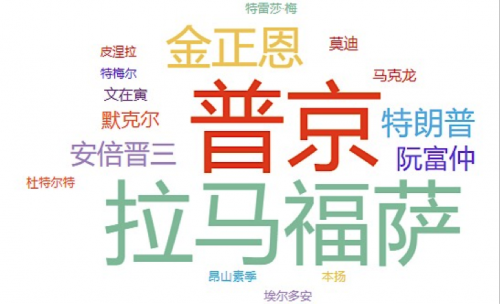
本月外国政要曝光排名有较大变化,上月位居第一的特朗普大幅下降,排名第四,只出现11次。排在他前面的依次是俄罗斯总统普京(30次)、南非总统拉马福萨(28次)、朝鲜劳动党委员长、国务委员会委员长金正恩(15次)。
本月,习近平赴俄罗斯出席第四届经济论坛,和“最知心的好朋友”普京进行了多次会面。出席中非合作论坛北京峰会、对南非进行国事访问,巩固中非团结合作关系。9月9日为朝鲜国庆70周年,习近平向金正恩致贺电,强调中朝两国是山水相连的友好邻邦,愿携手推动中朝关系长期健康稳定发展。
此前几个月,特朗普在《人民日报》上的出镜率基本第一,八、九两月的排位都相对靠后,提到他,《人民日报》表示“继续对伊朗和其领导人进行抨击”、“特朗普极端的“美国第一”路线甚至在直接受益的群体中都已播下了不信任的种子”、“特朗普政府对自中国进口产品加征关税,是不负责任的贸易保护主义,严重违反了世贸组织规则”。
九月,人民日报上没有见到加拿大总理特鲁多的身影。
本月聚焦
定于一尊?
“定于一尊”“一锤定音”组合曾出现于7、8两月的人民日报,分别为4次、3次,语温属“冷”;9月则在人民日报零出现。
9月7日新华社通稿《努力创造无愧于新时代的光辉业绩》报道对5月中央办公厅印发的《关于进一步激励广大干部新时代新担当新作为的意见》的反应。文章使用了“定于一尊 一锤定音”,全国仅19份报纸刊发。人民日报没有转载这篇通稿,而是刊登了该报记者采写的同题材报道《让想干事者有机会 让能干事者有舞台》,未使用“定于一尊,一锤定音”。延伸至全国报纸,九月在报纸上未出现“定于一尊 一锤定音”的省(市)有:北京、天津、上海、河北、吉林、黑龙江、江苏和安徽。
人民日报本月惟一一次使用“定于一尊”,是负面意义的,《绘就全面依法治国的斑斓画卷——党的十八大以来我国全面推进依法治国新成就综述》一文提到:“世界上不存在定于一尊的法治模式,也不存在放之四海而皆准的法治道路”。
有趣的是,上海新民晚报9月13日刊登《同娱盛夏“大家猜”》的文章,提到在上海工人文化宫的灯谜大家猜活动中,有一条谜面是戏剧中常用的语句“全凭爹爹做主”,打一成语。谜底是“定于一尊”(尊,令尊,父亲也)。
“金融监管”微信指数飙高
全球金融危机之后,我国金融监管经历了一系列的探索和模式演变。2008年推出4万亿的投资计划。在逆周期的经济刺激政策之下,国民经济在2012年之后开始企稳回升,但是由于原有的产业结构升级并未到位,4万亿的投资计划给国民经济带来的负面冲击如产能过剩、资产价格泡沫等问题日益显现。同时,国家经济发展面临的外部环境日益复杂,经济积累的系统性风险上升,每一次危机都意味着金融监管的失败和随之而来的重大变革。
9月,金融监管相关组织也是动作频频,通过“微信指数”,可看出相关活动及讨论的传播走势。
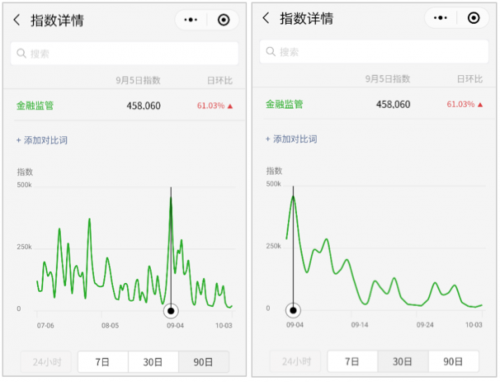
9月伊始,“金融监管”的搜索指数攀升,并于9月5日到达近90日曲线的最高点。归因于8月底银保监会、证监会的一系列举措:8月29日,中国银保监会召开银行保险监管工作电视电话会议,学习贯彻党中央、国务院关于下半年经济金融工作的安排部署,对近期重点工作任务提出要求;8月31日,银保监会依法对5家省联社违法违规问题进行行政处罚,同日,证监会正式印发《中国证监会监管科技总体建设方案》。
第二个峰值出现在9月8日。前一天,国务院金融稳定发展委员会召开第三次会议,分析当前经济金融形势。会议认为,当前各类金融风险得到稳妥有序防范化解,金融市场风险意识和市场约束逐步增强,要防范“黑天鹅”,保持股市、债市、汇市平稳健康发展。据统计,自今年7月新一届国务院金融委亮相至今以来,两个多月时间里已经召开三次会议及一次专题会议,并且都是国务院副总理、金融委主任刘鹤主持。
之后,搜索指数波动下降,16日到达一个低点。9月16日下午 纪念改革开放四十年暨50人论坛成立二十周年学术研讨会在北京举行,刘鹤出席论坛,吴敬琏、樊刚、吴晓灵等业界专家学者齐聚北京。论坛上,经济学界的智囊们既总结成功经验,又从不同角度澄清了当前束缚改革的一些阻力和变数。其中,防范系统性金融风险、完善金融监管,仍是讨论的主题之一。次日,搜索指数出现一个新的小高峰。
随后,受中秋假期的影响,22至24日的指数都处于低位,节后略有回升。
与搜索指数情况相反,人民日报和全国报刊中出现“金融监管”的文章篇数,在9月明显下滑(见下图)。
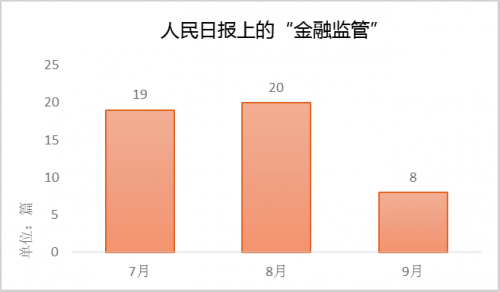
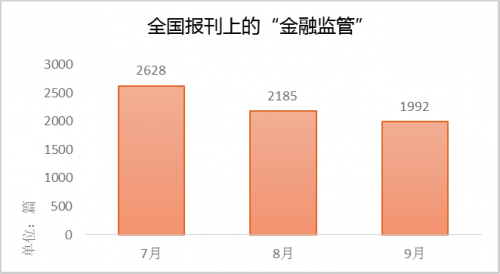
“第二次社会主义改造”
临近改革开放40周年纪念日,2018年9月,中国网络上出现多篇逆改革开放的文章或讲话。
9月11日,一个叫吴小平的人提出“中国私营经济已完成协助公有经济发展的任务,应逐渐离场”。
同一天,人力资源和社会保障部副部长邱小平在一个会议上讲话,号召私营企业职工“参与企业管理、共享企业发展成果”。
仅仅5天后,9月16日,一个党校教授发表下面的文章:
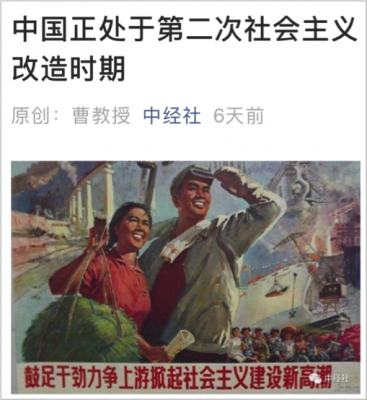
作者称:“共产党人从来不屑于隐瞒自己的观点和意图:消灭私有制”,“中国进入第二次社会主义改造时期已经成熟”。
这一系列逆改革言论,使网络哗然。“社会主义改造”,这个已经很少在媒体出现的词语,又变成了传播热词。
1949年中共建政,实行的是新民主主义制度。从1952年到1956年,对农业、手工业和资本主义工商业进行了社会主义改造,社会主义的基本制度由此确立。毛泽东大规模消灭了私有经济,并试图迅速、彻底实现“一大二公”,一系列灾难就此降临。
从1957年到2017年,“社会主义改造”一语在人民日报的传播频率如图。改革开放以后,“社会主义改造”在人民日报成为冷词。
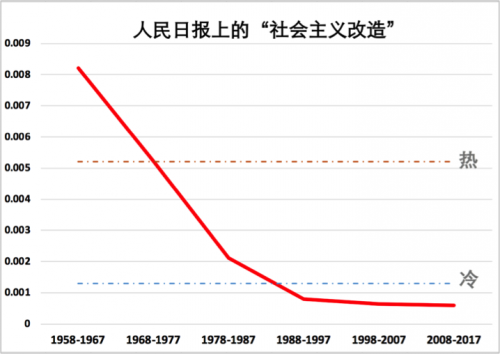
9月27日,原中共中央统战部副部长胡德平(胡耀邦之子)发表讲话:《警惕打着共享的旗号搞新的公私合营》。讲话披露,1991年中共中央15号文件指出,对私营企业主,不要“像50年代那样对他们进行社会主义改造”。
《中国正处于第二次社会主义改造时期》一文的作者,名曹习华,是长沙市委党校副教授,网络显示,他曾到不同单位宣讲“19大精神”。
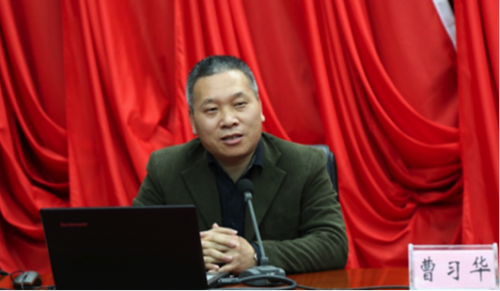
曹教授似乎没有注意到19大已淡化对50年代社会主义改造的肯定。但他对近年来“国进民退”的大气候十分敏感,这使他嗅到了“第二次社会主义改造”的味道。
四十年关键词之舆论监督
“舆论监督”是改革开放在新闻传播领域的旗舰性话语。1986年(不含)以前,这个词语在人民日报一共只出现过7次。
党媒语境下的舆论监督,经历了勃发(1988)、消沉(1989-1991)、震荡(1992-2002)、博弈(2003-2012)和淡出(2013-2018)。1980年以来,语温基本保持在“温”和“暖”区间,如下图所示。
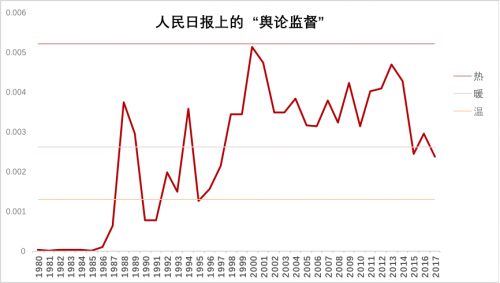
“舆论监督”在1987年尚属“冷”词,全年共在20篇文章中出现。
1988年,“舆论监督”首次由冷跃升至暖。这是“舆论监督”元气旺盛的时期,人民日报全年有124篇文章使用此词。4月6日第2版右下,一篇题为《希望公布国家领导人员候选名单》的短文吸引笔者目光。作者认为,“扩大国家最高权力机构政务活动的开放程度,便于实行舆论监督和群众监督。”舆论监督之锋芒可谓空前绝后。
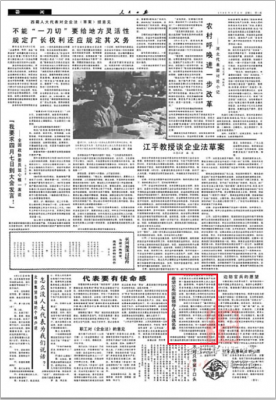
1989-1991年见证了“舆论监督”语温跌入谷底的过程。
1989年2月8日第1版刊登《天津不是害怕批评的地方》,报道天津市长李瑞环在春节前夕邀请中央及外地新闻单位驻津记者谈舆论监督和新闻改革。记者引用李的观点称:加强舆论监督,经常“微调”,可以避免“大修”。
仅过了10个月,李瑞环已跻身政治局常委。1989年11月25日,他在中宣部举办的新闻工作研讨班上发表讲话:《坚持正面宣传为主的方针》,认为“改进新闻工作需要研究和解决的问题很多,……关键的问题是新闻报道必须坚持以正面报道为主的方针”。这篇讲话分10个章节提出“看法和意见”,其中第六条为正确实行舆论监督。
这段论述把新闻舆论监督分成两类,一类是“搞资产阶级自由化的头面认为所鼓吹的”,另一类是“我们所说的”。对于如何“正确发挥新闻舆论的监督作用”,李讲的很实在:“新闻单位通过内部参考、内部简报向上反映问题,必须力求准确,不得掺假,以免提供错误信息”;“要充分发挥新闻的能动作用。要选择那些人民群众普遍关心而又有条件解决的问题作公开报道。”
人民日报在1990年3月3日头版刊登了这篇讲话,讲话也刊登在1990年3月的《新闻战线》杂志上,封面一图胜千言。
1992-2002年,舆论监督与舆论导向提法并重。受邓小平南巡带动,其在1992、1994年的语温皆有升级(冷至温,温至热)。
1994年,中央电视台新闻评论部创办《焦点访谈》,在略有松动的传媒生态中,竖起舆论监督的大旗。1998年10月7日,朱镕基到中央电视台视察,将“舆论监督,群众喉舌,政府镜鉴,改革尖兵”这四句话赠给《焦点访谈》栏目组。他说,“这四句话是我考虑了很久才想出来的,代表我的心声。”“在舆论监督面前没有特权,我本人也属于你们监督的对象。”
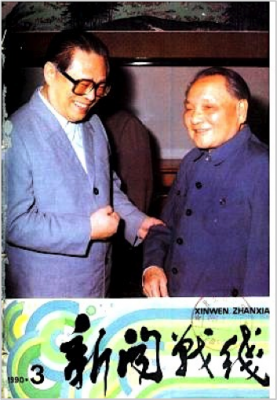
胡温主政的2003-2012年,在资讯科技和公民社会的加持下,舆论监督成为媒体与权力、市场的博弈场。
2001年,时任中国青年政治学院新闻与传播系主任展江教授发起并主办“新世纪新闻舆论监督研讨会”,每年征集优秀舆论监督作品,并请主创记者或编辑到会交流。研讨会从门户网站勃兴的Web 1.0时期,延续至微博、微信等社交媒体发挥舆论监督作用的Web 2.0时期,每一届都吸引学界和业界的顶级专家、高手参与,成为业内公认最有影响的年度会议。
2013年后,“新世纪新闻舆论监督研讨会”已难觅寄身之地。党报中,“引导舆论”取代“舆论监督”,“舆论”由主语位置成为被归置的对象。




















